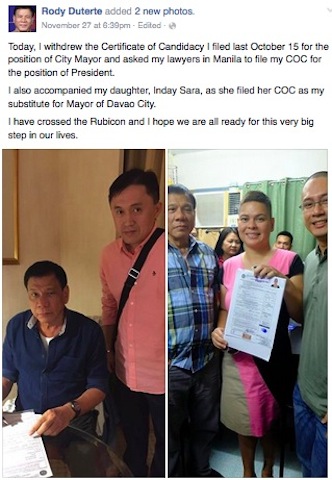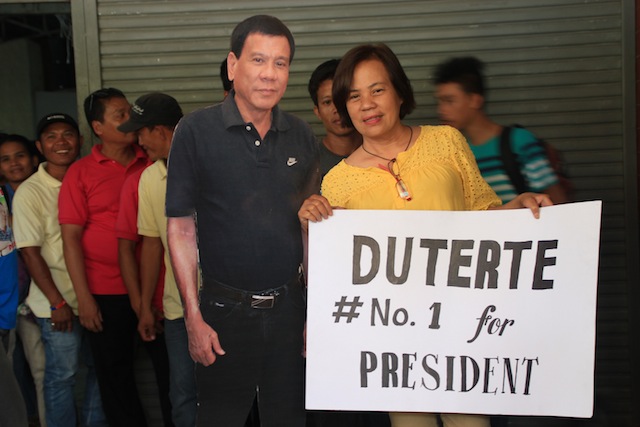DAVAO CITY (MindaNews/26 November) — Mayor Rodrigo Duterte says he doesn’t have the “superiority and talent, managerial ability and all” but a what he can offer the country is what he has done in Davao City, his “Exhibit A.”
“My Exhibit A is Davao City. If the way it is run is not fit for a national strategy.. then look for somebody else who can do it,” Duterte told Congress reporters Friday night at the Matina Enclaves, hours after he withdrew his certificate of candidacy (COC) for reelection as mayor at the Commission on Elections office (Comelec) in Davao City, and his (COC) for President filed before the Comelec office in Manila by a lawyer.
Duterte’s moves on Friday came a day after media reported he topped a Pulse Asia survey of preferred presidential candidates in the National Capital Region (NCR).
 “I have crossed the Rubicon,” Davao City Mayor Rodrigo Duterte says of his decision to run for President. (From Dutere’s official Facebook account)
“I have crossed the Rubicon,” Davao City Mayor Rodrigo Duterte says of his decision to run for President. (From Dutere’s official Facebook account)
The survey was commissioned by “a private group that is supportive of Duterte’s candidacy” according to Pulse Asia, involving 300 respondents and a margin of error of plus or minus 6 per cent.
Duterte topped the survey with 34% followed by 26% for Poe, 22% for Vice President Jejomar Binay, 11% for former Local Governments Secretary and administration bet Mar Roxas, and 7% for Senator Miriam Santiago.
6.17 million voters
The NCR or Metro Manila is composed of 16 cities — Manila, Caloocan, Makati, Malabon, Mandaluyong, Marikina, Muntinlupa, Navotas, Parañaque, Pasay, Pasig, Quezon City, San Juan, Taguig, and Valenzuela; and one municipality, Pateros.
According to the Comelec website, the NCR has 6.17 million registered voters as of the October 2013 barangay election.
Given the margin of error of 6%, the survey results show that Duterte, Poe and Binay are in a three-way tie in the NCR, Pulse Asia said.
In response to a query e-mailed by MindaNews, Prof. Ronald D. Holmes, Pulse Asia President and Managing Fellow, said that while the survey was commissioned by Duterte supporters, “we maintain objectivity even in commissioned surveys.”
“One means of doing this is to frame the questions on our own. We also randomly select areas for the survey and completely adhere to the rules established in survey research,” he said.
Significant
Holmes also pointed to the September survey of Pulse Asia that showed Duterte “already generated significant pre-election preference in NCR.”
The September survey was conducted starting September 8, a day after Duterte’s first announcement that he was not running for President.
A review of Pulse Asia’s surveys showed Duterte was not among 15 names listed for its survey in September 2014. Duterte was included in the survey starting March 2015 where he tied at third place nationwide with Manila mayor Joseph Estrada at 12%, Binay as number 1 at 29% and Poe at 12%.
In the NCR, Duterte was a preferred Presidential candidate by only 7% in March 2015 but by June, the figure rose to 11% then 21% in September and 34% in November.
The survey in the NCR, commissioned by a Duterte supporter, was conducted on November 11 and 12, just a few days after Duterte announced he was considering to run for President.
On November 8, exactly a week after saying “nothing has changed” even as the Partido Demokratiko Pilipino-Lakas ng Bayan (PDP-Laban) compelled him to substitute for PDP Secretary-General Martin Dino who earlier withdrew his candidacy for President, Duterte said he “might just decide to run as president” if the Filipino people continue to be oppressed.
 While waiting for Davao City Mayor Rodrigo Duterte to arrive, supporters in Alabel town, Sarangani Province queue for a photo with the mayor’s standee at entrance of the provincial gymnasium on November 27, 2015. . MindaNews photo by TOTO LOZANO
While waiting for Davao City Mayor Rodrigo Duterte to arrive, supporters in Alabel town, Sarangani Province queue for a photo with the mayor’s standee at entrance of the provincial gymnasium on November 27, 2015. . MindaNews photo by TOTO LOZANO
“I do not like the way the oppressed Filipinos are being treated now. Oppressed na, wala pang matakbuhan. Pagsinobrahan ninyo kastigo ang mga Filipino, I might just decide to run as president,” said Duterte, who had earlier expressed disgust over how the national government was “inutile” to stop the “Laglag Bala” extortion scheme that had been victimizing several passengers at the Ninoy Aquino International Airport, many of them Overseas Filipino Workers.
“Not aware”
Duterte claimed he was not aware a survey was commissioned for him.
Since the September survey, Duterte has landed on front page news and main headlines on radio and television due to his flip-flops on running for President.
Duterte has repeatedly said he has earned too many accolades to last him a lifetime, having served as government prosecutor in the city from 1977 to 1986, OIC vice mayor from 1986 to 1988, mayor from 1988 to 1998, congressman of the first district from 1998 to 2001, mayor again from 2001 to 2010, vice mayor from 2010 to 2013 and mayor again since 2013.
Duterte’s leadership style has earned both praises and criticisms. Praises because, among others, the city has deputy mayors for the Moro and Lumad tribes, it was the first to introduce a Children’s Code, an anti-discrimination ordinance, an effective smoking ban, a ban on the sale and use of firecrackers and other pyrotechnics during Christmas and other holidays, a speed limit ban.
He openly supports the peace processes with the Moro liberation fronts and the communist New Peoples Army, goes to the hinterlands to receive hostages freed by the NPA, and is perhaps the only city mayor in the country who has allowed supporters and sympathizers of an NPA commander slain this year, to carry and wave their red flags at the funeral procession along the city’s major streets.
Duterte is known for his hardline stance against kidnappers, drug pushers and other criminals and has been accused of tolerating extra-judicial or vigilante-style killings in the city.
Time Magazine put him on the cover of its July 19, 2002 issue as “The Punisher.”
CHR probe
The Commission on Human Rights (CHR) under then CHR chair Leila de Lima, now a senatorial candidate after serving as Justice Secretary from 2009 to October this year, conducted a public inquiry in 2009 following reports that at least 800 persons had been summarily executed in the city since 1998, by a band referred to as “Davao Death Squad” and their later copycats.
De Lima called the extralegal killings in the city “shockingly intolerable.”
At the probe, Duterte repeated previous pronouncements but this time under oath, that there are no state-sponsored killings in the city, and that he would resign the mayoralty “if there is an iota of evidence” that he, the military or police, are behind these killings.
A week later, the New York-based Human Rights Watch (HRW) released its report on “death squad killings in Mindanao” titled “You Can Die Anytime.”
The 103-page report “found evidence of complicity and at times direct involvement of government officials and members of the police in killings by the so-called Davao Death Squad.”
Reacting to the report, Duterte said that if the CHR and HRW Executive Director Kenneth Roth “do not like what’s happening here, they better not come here anymore if they think that Davao City is a dangerous place.”
“They won’t understand me: they speak of human rights, I speak of securing the welfare of the entire city,” Duterte said. (Carolyn O. Arguillas / MindaNews)
